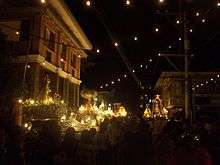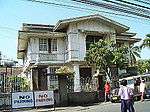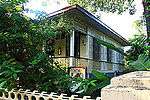Malolos Historic Town Center
The Malolos Historic Town Center is a historic district located in downtown or old town center of the capital town of Malolos City, Bulacan, Philippines commonly called Camestisuhan or Pariancillo District of Malolos with its collection of Spanish and American-era houses and government structures, as well as being the birthplace of the First Philippine Republic, the Malolos Constitution and being the capital of the Philippines from 1898–1900, the National Historical Institute (now the National Historical Commission of the Philippines) declared the downtown Malolos city as a National Historical Landmark and a Heritage Town dated August 15, 2001.[1]
| Malolos Historic Center and Heritage Town | |
|---|---|
| Native name Tagalog: Makasaysayang Kabayanan at Pamana ng Bayan ng Malolos | |
 The Calle Santo Nino one of the streets of Camestisuhan District at the heart of the declared Historic Town Center of Malolos | |
| Type | Heritage Zone |
| Location | Malolos Downtown City of Malolos, Bulacan, Philippines 3000 |
| Coordinates | 14°50′40.2″N 120°48′40.6″E |
| Built | 1580, 1673, 1800, 1840, 1900, 1930 |
| Architect | various |
| Architectural style(s) | Spanish, American, Post-war |
| Governing body | City Government of Malolos and National Historical Commission of the Philippines |
| Official name: Malolos Heritage Town | |
| Designated | August 15, 2001 |
.svg.png) Location of Malolos Historic Center and Heritage Town in Philippines | |
History
Camestisuhan District of Malolos was originally called Pariancillo. It is the district intended for the Chinese residents of Malolos in 1700s. It is all started in 1755 when Governor General ordered the expulsion of Chinese from the Philippines due to their participation in some rebellion and sedition against the Spanish Government. Some of them were transferred to Malolos at ths time which was already a hub for some Chinese and in able to be far from Spanish Government in Manila. When hearing about the migration, Governor General orders that the towns outside Manila should have a special district for them, thus the Malolos Pariancillo was established Pariancillo means "small parian". Upon the order there are provision for those Chinese who resides in the town for the longest time that they will not be expelled if they married a native of Malolos and so the Sangleys of Malolos were born and the Pariancillo became the Chinese enclave in Bulacan Province.
Rationale for Declaration as Historic Town Center
The board resolution cites several reasons for the declaration of certain areas in downtown Malolos as National Historical Landmark and heritage Town:[1]
- A number of men and women from Malolos became key figures in revolutionary movements during the Spanish-era;
- Malolos was declared capital of the First Philippine Republic and its Spanish-era infrastructure reused as government offices such as convent of the Malolos Cathedral, Barasoain Church and several houses along the Pariancillo/Kamestisuhan district;
- Malolos has retained a good number of note-worthy, old houses and other buildings which attest to the artistry, craftsmanship and ingenuity of its builders
Declared Areas
According to the board resolution, the following streets are identified as part of Malolos Historic Town Center:[1]
| Paseo del Congreso Street from Barasoain church to Malolos bridge | San Agustin |
| Padre Jose Burgos Street bound by Enriquez St. and Malolos Bridge | |
| Hipolito Street bound by P. Burgos and Enriquez Streets | |
| Cigarillera Street (Tampoy) | Santo Niño |
| Pariancillo Street | |
| Santo Niño Street | |
| F.T. Reyes (Electricidad) bound by Santo Niño Street and M. Tengco Street | |
| M. Tengco Street bound by F. T. Reyes and F. Estrella Streets | |
| F. Estrella Street bound by Liang River and Kanto Boy Street | |
| Santiago - Cruz House at Jacinto Street (Pariancillo) | |
| Pineda and Aldaba Houses at F. T. Reyes Street | |
| Malolos Water Cistern at Plaza Torres | San Vicente |
Built Heritage
Within the Declared Heritage District
The following table lists down extant built heritage within the areas declared by the National Historical Institute:
| Cultural Property wmph identifier |
Site name | Description | Province | City/municipality | Address | Coordinates | Image |
|---|---|---|---|---|---|---|---|
| Abad House | Ancestral House | Bulacan | City of Malolos | Cigarillera Street | 14.843977°N 120.810735°E | ||
| Gobierno Militar dela Plaza | - former ancestral of Dona Gregoria Adriano, became site of the Military Government established by Gen.Isidoro Torres, reused as Meralco Office | Bulacan | City of Malolos | Pariancillo Street | 14.843065°N 120.810498°E | ||
| Dr.Johny Reyes House | Ancestral House | Bulacan | City of Malolos | 752 F. Estrella Street | 14.842064°N 120.811348°E |  | |
| Casa Real Shrine | Built in 1580, this served as residence and office of the Gobernadorcillo of Malolos. It became the Treasury of Spanish Government during British Invasion of Manila and Casa Real in 1901. Today it is the Museum of Political History of the Philippines | Bulacan | City of Malolos | Paseo del Congreso Road | 14.844320°N 120.811561°E |  | |
| Casa Tribunal de Malolos | built in 1673 original house of the Adriano family and used as the Second Municipal Hall of Malolos in 1859 converted into a jailhouse during the First Philippine Republic in 1898. | Bulacan | City of Malolos | Pariancillo Street | 14.843312°N 120.810122°E | ||
| Cathedral - Minor Basilica and Parish of the Immaculate Conception | built in 1580 and the present masonry church built in 1817 | Bulacan | City of Malolos | 14.842595°N 120.811575°E | |||
| Crisostomo House | Spanish-era Ancestral House | Bulacan | City of Malolos | 50 Pariancillo Street | 14.842879°N 120.809476°E | ||
| Don Ramon Gonzalez de Leon House | Built in 1923, Chalet-type Ancestral House of Gobernadorcillo Don Ramon Gonzales de Leon | Bulacan | City of Malolos | Cigarillera Street | 14.844004°N 120.810501°E |  | |
| Dr. Luis Santos Art-Deco House | Built in 1933, Art Deco House of Dr Luis Uitangcoy Santos son of one of the women of Malolos Doña Alberta Uitangcoy Santos | Bulacan | City of Malolos | F. T. Reyes Street | 14.841701°N 120.811005°E | ||
| Don Erastro Cervantes House | Spanish-era House | Bulacan | City of Malolos | Pariancillo Street | 14.843395°N 120.810913°E | ||
| Eden Cinema | Post War Movie House | Bulacan | City of Malolos | Pariancillo Street | 14.843215°N 120.810605°E | ||
| Don Fausto Chiong House | House of Don Fausto Chiong built in 1892 and it became Sectretaria de Interior in 1898-1899 | Bulacan | City of Malolos | Pariancillo Street | 14.843313°N 120.810704°E | ||
| Fountain, Dr. Luis Santos House | Sculpture by National Artist Guillermo Tolentino | Bulacan | City of Malolos | F. T. Reyes Street | 14.841616°N 120.810853°E | ||
| Hermogenes Reyes House | 1904 House | Bulacan | City of Malolos | F. T. Reyes | 14.842224°N 120.810234°E | ||
| Holy Infant Academy | Former clinic of Dr. Luis Santos | Bulacan | City of Malolos | F. T. Reyes Street | 14.841915°N 120.810861°E | ||
| Iglesia Filipiniana Independiente | Aglipayan Cathedral Church of Malolos built in 1903 | Bulacan | City of Malolos | F. Estrella Street | 14.841205°N 120.812208°E | ||
| 1893 Jose Cojuangco House (Tagalog: Pook Kapanganakan ni Jose Cojuanco) | Birthplace of Jose Chichioco Cojuangco, with marker from the National Historical Commission of the Philippines | Bulacan | City of Malolos | Paseo del Congreso | 14.845007°N 120.812699°E | ||
| 1930 Jacinto-Lomotan House | American-era House | Bulacan | City of Malolos | Santo Niño Street | 14.842708°N 120.809928°E | ||
| Paaralang Bayan ng Malolos | mission-style, Gabaldon-type Schoolhouse built in 1913 | Bulacan | City of Malolos | F. Estrella Street | 14.839539°N 120.813221°E | ||
| Malolos City Hall | Neo-Classical town hall erected in 1940 | Bulacan | City of Malolos | F. Estrella Street | 14.843815°N 120.811239°E | ||
| Aguas Potables de Malolos | American period water tank built in 1923 | Bulacan | City of Malolos | Plaza Torres | 14.842896°N 120.812390°E | ||
| 1930 Mariano Crisostomo House | American-era House | Bulacan | City of Malolos | F. Estrella Street | 14.840496°N 120.812406°E | ||
| Our Lady of Mount Carmel Parish Church | built in 1885 popularly referred to as Barasoain Church | Bulacan | City of Malolos | Paseo del Congreso Road | 14.846456°N 120.812385°E | ||
| 1930 Tantoco-Lopez House | Bulacan | City of Malolos | Santo Niño Street | 14.842808°N 120.810498°E | |||
| Capilla de Santa Veronica | ancestral house of the Reyes Family converted into a private chapel | Bulacan | City of Malolos | Santo Niño Street | 14.842860°N 120.810029°E | ||
| Capila de Nuestra Senora del Santisimo Rosario de Malolos | Stone chapel built in 1870 | Bulacan | City of Malolos | F. Estrella Street | 14.840326°N 120.811899°E | ||
| Don Jose Bautista House | Spanish-era house famous for its caryatid posts. Has ornately sculpted Neo-Classic touches and was built in the 1850s and redecorated in 1877 in the French Art Nouveau style. It was the Secretaria de Fomento and home of Don Antonio Bautista, Aguinaldo's Secretary of the Interior. It contains heirloom memorabilia including the original KKK flag and here, José Rizal and Marcelo H. del Pilar spoke to the 21 women of Malolos on June 27, 1892. | Bulacan | City of Malolos | Santo Niño Street | 14.842567°N 120.810345°E | ||
| Paaralan ng mga Kababaihan ng Malolos | Remaining stone wall or ruins of the Instituto Mujeres, with marker from the National Historical Commission of the Philippines. Site where Rizal addressed his famous letter to the 21 women of Malolos who petitioned Governor General Valeriano Weyler for a night school for women on December 12, 1888 | Bulacan | City of Malolos | Santo Niño Street | 14.842588°N 120.809703°E | ||
| Tampoy Bridge | also known as Malolos Bridge. Spanish-era bridge built in 1817 by Fr. Melchor Fernandez OSA and renovated during American Period in 1925 | Bulacan | City of Malolos | 14.843985°N 120.811423°E | |||
| 1812 Antonio Bautista House | stone house built in 1812, the oldest in Malolos owned by chinese matriarch Dona Rufina Tanjosoy heir by her son Don Antonio Bautista House, famous for its Art-Nouveau Interiors with design contributions from Isabelo Tampingco done in 1910 | Bulacan | City of Malolos | Calle Burgos cor. Paseo del Congreso Road | 14.844590°N 120.811321°E | ||
| 1914 Alberta Uitangcoy-Santos House | declared a Heritage House (Level 1) by the National Historical Commission of the Philippines | Bulacan | City of Malolos | F. T. Reyes Street | 14.841988°N 120.810416°E |
Outside the Declared Area
The following table lists of structures in Malolos extant built heritage outside the declared National Historical Landmark by the National Historical Institute but are still covered by the National Cultural Heritage Act of 2009 as cultural property:[2]
| Cultural Property wmph identifier |
Site name | Description | Province | City/municipality | Address | Coordinates | Image |
|---|---|---|---|---|---|---|---|
| 1858 Barasoain Catholic Cemetery | The Jacinto Masouleum built in 1859 | Bulacan | City of Malolos | Calle Antonio Bautista | 14.848684°N 120.809857°E | ||
| Bulacan Provincial Capitol | Art-deco capitol designed by Juan Arellano and William Parsons erected in 1930 | Bulacan | City of Malolos | 14.8565°N 120.8144°E | |||
| Fausto Chiong House | 1933 American-era House | Bulacan | City of Malolos | Malolos-Hagonoy Provincial Road | 14.839918°N 120.801549°E | ||
| Campo Santo de Malolos | Spanish-era cemetery built in 1680 | Bulacan | City of Malolos | Tubigan Street | 14.841101°N 120.814708°E | ||
| Estacion Ferrocaril de Malolos | Spanish-era train station built in 1892 | Bulacan | City of Malolos | 14.854087°N 120.814195°E |  | ||
| 1863 Santa Isabel de Ungria Parish Church | Mudejar-style stone church | Bulacan | City of Malolos | Caluag Street | 14.839509°N 120.834376°E |
Important Cultural Properties
One of the features of Malolos Historic Town Center are the monuments created by the artisans and National Artist can be found at different areas in the city.
| Structure | Provenance | Site Location | Artist |
|---|---|---|---|
| Stone Fountain | 1933 | Dr. Luis Santos Art Deco House | Guillermo Tolentino |
| Bounty Harvest Painting | 1933 | Dr. Luis Santos Art Deco House | Fernando Amorsolo |
| Gat Francisco Balagtas Marble Bust | 1950 | Malolos Plaza and Rotounda | Guillermo Tolentino,National Artist |
| Brass Bust of Marcelo Hilario del Pilar | 1903 | Malolos City Hall Plaza | Hilario Sunico, Bellcaster of 19th century |
| Brass Bust of Dr.Jose P. Rizal | 1901 | Plaza Rizal, Casa Real, Malolos City | Hilario Sunico, Bellcaster of 19th century |
| Bronze Statue of Emilio Aguinaldo | 1950 | Barasoain Church Plaza, Malolos City | Antonio Caedo,pre-National Artist |
| Gen.Isidoro Torres Monument | 1950 | Plaza Torres, Malolos Market | n/a |
| Jose Rizal Statue | 1923 | Malolos Central School | n/a |
| The Propagandista Triumvirate | 1950 | Bulacan Capitol Compound, Malolos | n/a |
| President Ramon Magsaysay | 1960 | Bulacan Capitol Compound, Malolos | |
| General Gregorio del Pilar | 1950 | Bulacan Capitol Plaza, Malolos | n/a |
References
- "Declaring the Historic Town Center of Malolos in Bulacan as a National Historical Landmark" (PDF). http://nhcp.gov.ph/. National Historical Commission of the Philippines. Archived from the original (PDF) on 2 April 2015. Retrieved 30 March 2015. External link in
|website=(help) - "National Cultural Heritage Act of 2009" (PDF). ncca.gov.ph/. National Commission on Culture and the Arts. Archived from the original (PDF) on 2 April 2013. Retrieved 30 March 2015.